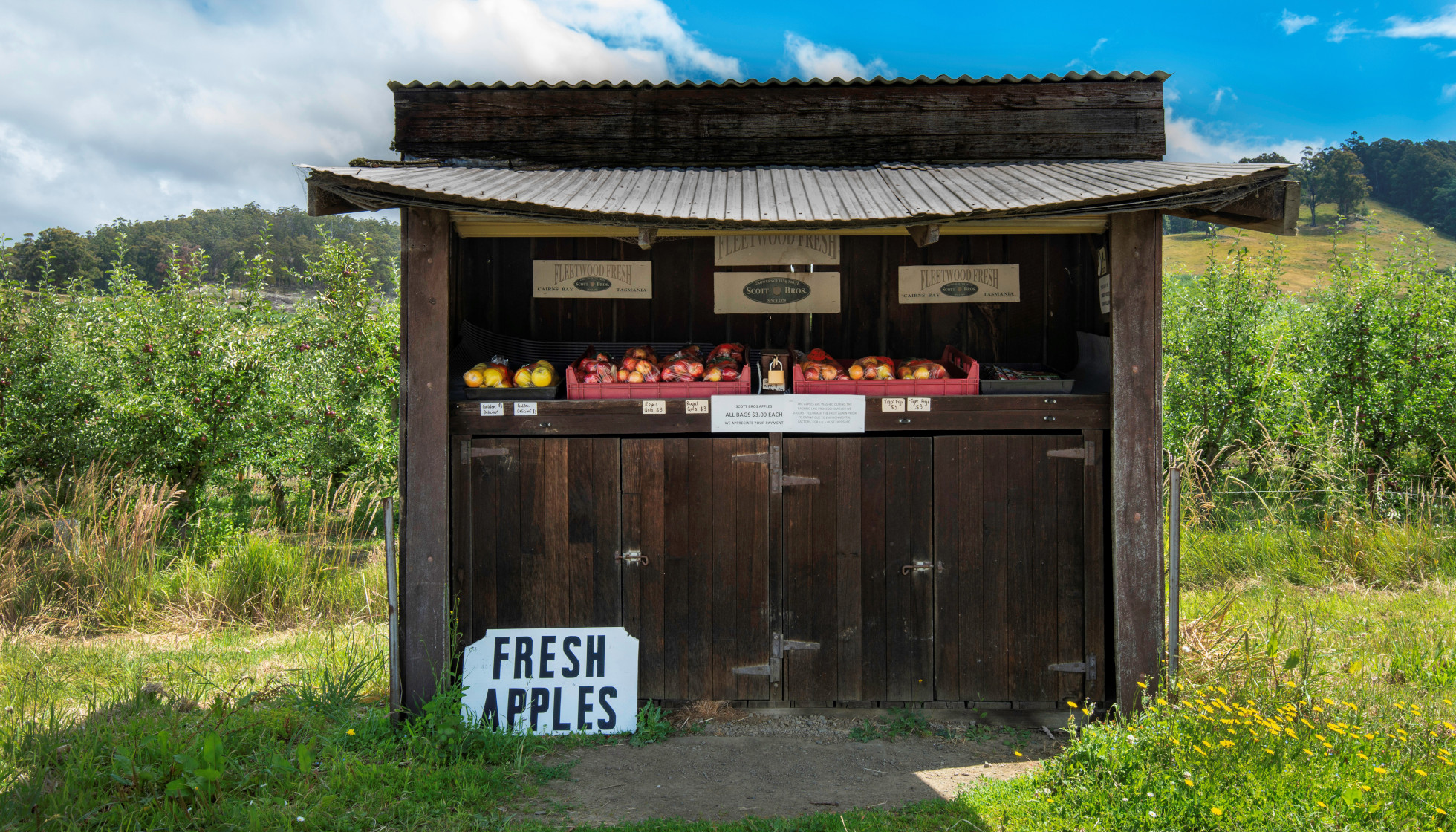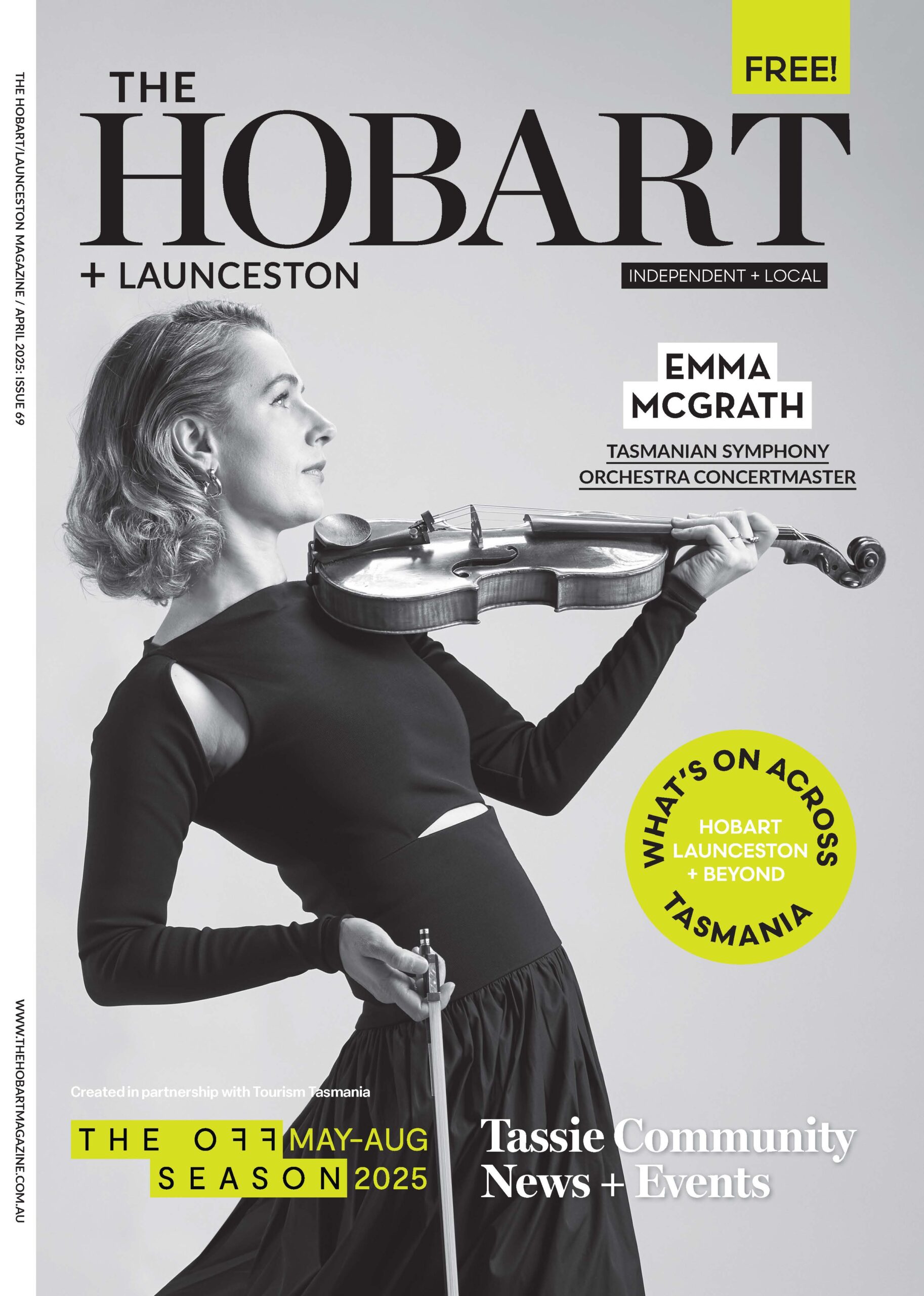The Unpredictable Business of Apples on the Isle
by Mary-Lou Stephens

There was a time when apple trucks lined the streets of Hobart, waiting to unload the wooden boxes with their brightly coloured labels at Constitution Dock.
Ships from all over the world opened their holds as cranes lifted large nets, heavy with apple boxes, and swung the cargo aboard. At Port Huon the apple boats waited three or four deep to be loaded and from there to transport our apples to distant places.
The Huon Valley itself was a sea of apple blossom every spring, and when it was harvest time the sound of apple boxes being nailed together rang throughout the valley. Pickers would come from miles away and work from dawn to dusk, plucking apples from the trees and placing them in the canvas bags slung across their bodies. In the packing sheds, the orchardist’s wives would usually be in charge, supervising local women keen for a little extra money, not only through the day but into the night as well. Packing was a fine art – take an apple in one hand and a square of tissue paper in the other, place the apple nose down into the middle of the paper, twist the apple around and then pack it on its side in the box.
In the 1960s the wooden boxes were phased out in preference for cardboard cartons which were lighter and more time efficient. Individual cells for each apple meant the apples no longer needed to be wrapped in the small squares of paper. In a way, the move away from the wooden apple boxes with their beautiful labels was a signal for the changes that were to come. Competition from overseas markets, the rising cost of freight, troubles with marketing, apple varieties falling out of favour – all of these put pressure on the orchardists. There was a time when a family could make a good living from ten acres of apples, but those times were fading by the end of the 1960s.
In 1973 Tasmania’s main export market disappeared overnight when England joined the Common Market. Apples were left to rot on the trees and the government came up with the Tree Pull Scheme to pay orchardists to bulldoze their trees. Many of those affected were tending orchards that had been in their families for generations. To see all that love, history and hard work being bulldozed into the ground was heart breaking. Some chose to grub out their trees and try other crops, some sold up and moved away, but others persisted.
When the idea for by book The Last of the Apple Blossom came to me, I knew writing this novel was going to affect me deeply. Growing up in Hobart, our family drives to the Huon Valley revealed hillsides covered in apple blossom. School excursions to the orchards featured wooden bins full of apples, packing sheds bustling with workers and endless rows of apple trees. Sadly, this is a way of life long gone, erased by natural and economic woes.
While researching apple growing in Tasmania I drew on many resources. The National Library of Australia’s Apples and Pears Oral History Project is a rich source of history and knowledge in this area. To hear the orchardists, many since passed away, talk about their personal experiences of working their orchards through the seasons and the years brought the history of the Huon Valley to life for me. However, I was still left with many questions.
I tracked down Naomie Clark-Port, owner of Frank’s Cider and an orchardist in the Huon Valley on a property established by her family in the 1800s. To describe Naomie as tenacious is an understatement. No matter the natural and economic disasters that were thrown at her, Naomie was determined to keep the orchard viable. We stood in her orchard surrounded by apple trees, some over 160 years old, as she told me stories of orchard life, struggle and perseverance. She also arranged interviews with some of the old orchardists in the area who remembered the events I write about in The Last of the Apple Blossom. I spent hours listening to their tales of bushfire, drought and hail, good harvests and bad. Over the course of our conversations they revealed many details that I never would have discovered otherwise. I’ve used several of their anecdotes in The Last of the Apple Blossom – they were too delicious not to.
I hope I’ve done the growers of the Huon Valley justice, those who worked hard all their lives through disasters and hardships so severe it would make most of us give up in despair. The novel is dedicated to theses orchardists and is inspired by a line from one of their oral histories, ‘I worked my entire life for nothing.’ I don’t think it was for nothing. The orchardists created beauty and purpose. Tasmania was The Apple Isle because of them – an enormous achievement. It might not have lasted, but to work and create, to live a useful life, that is not nothing.

